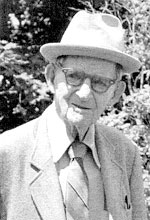Anderson, Nels

Bio: (1889-1986) American sociologist. Nels Anderson studied at the University of Chicago, at a time when the Department of Sociology was home to the famous Chicago School, led by Burgess and Park. He received his doctorate from the University of New York and taught at Columbia University. Anderson's first book, The Hobo: The Sociology of the Homeless Man (1923), which dealt with the homeless in Chicago, was the fruit of one of the first participatory studies, as a research method in sociology, because the author himself spent a lot of time on the street with the homeless themself. The period of industrial development that spread from the east to the west of the USA caused the need for occasional and seasonal work, which led to an increase in homelessness because this type of work was neither safe nor sufficient for a normal life. Anderson discovered that homeless people have different economic and ethnic backgrounds and that the reasons for falling into a state of homelessness are different. What unites them is the distrust towards all institutions, organizations, and people who have power, which was, in part, justified. After that, Anderson engaged in social work, conducted research in the field of labor in Germany, and was also the head of the UNESCO Institute for Social Research from 1953 to 1962. He has published numerous works on urban sociology, sociology of work and leisure, as well as several other works on homelessness.
Fields of research
City Community Everyday Life Homelessness Industry Institution and Organization Social Work State Trust WorkTheoretical approaches
Chicago SchoolMain works
The Hobo: The Sociology of the Homeless Man (1923);
Urban Sociology (1928);
Right to Work (1938);
Studies of the Family (1956);
Work and Leisure: A Perceptive Inquiry Into Current Ways of Using Time (1961);
Urbanism and Urbanization (1964);
The Industrial Urban Community: Historical and Comparative Perspectives (1971).

